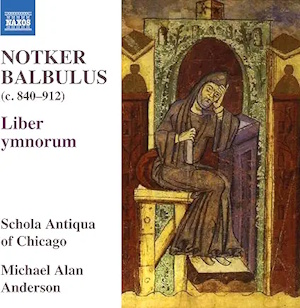
Notker Balbullus (c.840-912)
Liber ymnorum
Schola Antiqua of Chicago / Michael Alan Anderson
rec. 2022, St. Josephat Parish Church, Chicago, USA
Naxos 8.579169 [63]
This is some of the oldest music known to the Western World. How wonderful that it survives, and that it can be gathered for a recording. Notker the Stammerer, a renowned Benedictine monk at the Abbey of St. Gall in Switzerland, was a poet, scribe, singer and composer. The manuscript highlighted here, the Liber ymnorum, contains sequences for the liturgical year and for special feasts.
First, St. Gall. It was a Carolingian monastery, one of the most advanced culturally and philosophically. It seems that it had a very sophisticated layout, later followed throughout the Middle Ages. Notker was the right man at the right time. The monastery still exists but was reconstructed in the eighteenth century using some of the ancient walls and materials.
It seems that by Notker’s time the repertory of long melismas at the end of Alleluias had become very complex. He, and no doubt his fellow monks, had great difficulty in remembering them, so he decided to add texts to aid memory. He explains this in his own words, quoted in the booklet. Eventually he had collected a huge number of these ‘sequences’, and compiled them into the Liber ymnorum. They are therefore longer than any other chants, and become what one might call a magnificent liturgical song. The extraordinary texts are obviously full of biblical references. One might describe the poetry as heightened prose. So, in Laus tibi, Domine – a text for Holy Innocents – we read (in translation) ‘Who with tear dampening cheek, pities / the babe and the innocent … As you yourself a wailing babe’.
Did he compose some of the music, too? He is credited as the composer/poet. In some respects, it appears difficult to know. Some of the music may have been composed elsewhere. But at the end of texts the booklet credits Notker with all of the sequences. The other tracks are the standard and even more ancient Alleluias.
But what is this talk of sequences? These long hymns were sung before the gospel reading and after the Alleluia chant. There were many of these for each of the saints’ days, as here, for example, St. Peter and St. Michael. The disc offers, and I quote Calvin M. Bower’s helpful essay, ‘four sequences as they would have been sung after the Alleluia and the gospel reading’. For example, Alleluia, sanctificatus illuxit nobis is followed by the sequence Natus ante secula (tracks 1 and 2). The florid Alleluia Beatus vir segues into the sequence Sacerdotem Christi Martinum.(tracks 16 and 17).We also have sequences for general use. Summi triumphum regis would be one of these, ‘The triumph of the great high king/let us recount with praise’.
Schola Antiqua consist for this recording of seven men and two women. It is generally thought that this elaborate music was sung by a single voice, so the nine singers share the twenty-three sequences as listed in the booklet. This adds to the general austerity of the experience, and offer an opportunity to contemplate calmly, which is what this music is mostly all about. Some pieces which have more repetitive melodic lines, like Sancti Spiritus assit nobis gratia, are sung by all of the male voices but here the tone quality can be a little rough round the edges. The last track, Quid tu, virgo, uniquely opens with a male voice who speaks to Rachel of the Old Testament; a female voice sings her response: the beginnings of liturgical drama?
This is probably a rather niche disc. Yet if your ‘bag’ is plainchant and you are inquisitive about early musical history, then this release – with all its fine performances, interesting essay and complete texts very well translated – is for you.
Gary Higginson
Buying this recording via a link below generates revenue for MWI, which helps the site remain free



Contents
Alleluia. Dies sanctificatus illuxit nobis
Natus ante saecula
Laus tibi, Christi
Gaude Maria virgo
Alleluia, Benedictus es
Festa Christi omnis
Virginis venerandae
Iudicem nos inspicientem
Summi triumphum regis
Sancti Spiritus assit nobis gratia
Alleluia: Istus ut palma florebit
Sancti baptistae Christi praeconis
Peter summe Christi pastor
Laurenti David
Stirpe, Maria, regia procreate
Magnum te, Michahelem
Psallat Ecclesia
Alleluia, Beatus vir qui timet Dominum
Sacerdotem Christi Martinum
A solis occasu usque ad exortum
Deus in tua virtute
Agone triumphali
Quid tu, virgo

















